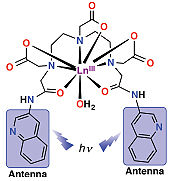|
|
|
|
Ashis K. Patra
PhD (IISc Bangalore)
|
Email: akpatra[AT]iitk.ac.in
Office Phone: 0512-259-6780
|
Associate Professor, Department of Chemistry
Specialization
Inorganic Chemistry, Bioinorganic Chemistry, Therapeutic Applications of Metal Complexes, Chemical Biology, Transition metal-Nitrosyl Chemistry, Luminescent Lanthanide Complexes and their Biological Applications.
Research Interest
Our research interests are in the interdisciplinary areas of inorganic chemical biology and bioinorganic chemistry. Our current research goal is to design and study novel cytotoxic metal complexes for targeted therapeutic and diagnostic applications. Their detailed chemistry, spectroscopy, structures and binding interactions with diverse biological targets, cytotoxicity and mechanism of actions were investigated. Currently we are pursuing following research projects in our laboratory.
I. Therapeutic Applications of Metal Complexes.
II. Nitric Oxide Delivery to Biological Targets from Transition Metal Nitrosyl Complexes.
III. Luminescent Lanthanide Complexes and Biological Applications.
|
|
|
|

Education
- PhD (2008), IISc, Bangalore
- M. Sc. (2002) The University of Burdwan

Website(s)
|
My research interests are in the interdisciplinary areas of inorganic chemical biology and bioinorganic chemistry. Our current research goal is to design and study novel cytotoxic metal complexes for targeted therap-eutic and diagnostic applications. Currently we are pursuing following research projects in our laboratory.
I. Therapeutic Applications of Metal Complexes:
The biggest change in drug development, particularly in the anticancer field, has been to move towards molecularly targeted agents to circumvent multidrug resistance. This holds promise of more selective and effective drug administration. Transition metals offer beneficial advantages over their more common counterpart of organic drugs. This includes a diverse range of coordination number and stereochemistry, accessible and tunable redox and electronic proper-ties, ligand substitution etc. We are engaged in the development of specifically targeted cytotoxic metal complexes for various therapeutic and diagnostic applications. Their detailed binding interaction studies with biological targets (nucleic acid, proteins etc.) and fate in biological medium were also investigated. Cytotoxicity and mechanism of actions of these metallodrugs will be evaluated to determine their efficacy and mode of actions.
II. Nitric Oxide Delivery to Biological Targets from Transition Metal Nitrosyl Complexes:
This project aims to design and synthesize transition metal nitrosyl complexes and studying their physicochemical properties and molecular structures. Releasing of nitrosyls from these complexes under various external stimulants will be investigated. We will also study their interaction with potential biological targets (Hb, Mb, GSH etc.) and potential therapeutic applications.
III. Luminescent Lanthanide Complexes and Biological Applications:
Studying chemistry and photophysical properties of lanthanide complexes is an interesting and active research area due to having a wide variety of applications of lanthanide complexes in imaging and diagnostics. Currently we are studying spectroscopic properties, structures and photophysical properties of a series of luminescent lanthanide complexes having organic chromophores as light absorbing antenna molecule for their applications as potential luminescent probes for various analytes or therapeutic applications.

-
CHM343/344A: Inorganic Chemistry Laboratory
-
CHM442: Inorganic Chemistry- II
-
CHM649: Principles of Inorganic Chemistry
-
CHM443A: Inorganic Chemistry Laboratory
-
CHM646: Bioinorganic Chemistry
-
CHM691A: Frontiers in Inorganic Chemistry
-
CHM242A: Basic Inorganic Chemistry
-
Luminescent europium(III)-platinum(II) heterometallic complex as theranostic agent: a proof-of-concept study, Dalton Trans., 45, 494 (2016).
-
Photocytotoxic luminescent lanthanide complexes of DTPA–bisamide using quinoline as photosensitizer, RSC Advances, 5, 107503 (2015).
-
Luminescent europium and terbium complexes of dipyridoquinoxaline and dipyridophenazine ligands as photosensitizing antenna: structures and biological perspectives, Dalton Trans., 44, 19844 (2015).
-
Overview and new insights into the thiol reactivity of coordinated NO in {MNO}6/7/8 (M = Fe, Co) complexes, Inorg. Chem. 54, 9351 (2015).
-
Square-antiprismatic eight-coordinate complexes of divalent first-row transition metal cations: a density functional theory exploration of the electronic-structural landscape, Inorg. Chem. 54, 1375 (2015).
-
Synthesis, properties, and reactivity of a series of non-heme {FeNO}7/8 complexes: Implications for Fe nitroxyl coordination, J. Inorg. Biochem., 118, 115 (2013).
-
A thermally stable {FeNO}8 complex: properties and biological reactivity of reduced MNO systems, Chem. Sci., 3, 364 (2012).
-
Stable Eight-Coordinate Iron(II/III) Complexes, Inorg. Chem., 49, 2032 (2010).
-
Four-Coordinate As(III)-N,S Complexes: Synthesis, Structure, Properties and Biological Relevance, Inorg. Chem., 49, 2586 (2010).
-
Synthesis, structure and properties of Ni(N2S2) complexes relevant to Nickel Superoxide Dismutase (Ni-SOD), Inorg. Chem., 48, 5620 (2009).
-
AT-selective DNA binding and double strand DNA cleavage by copper(II) complexes in PDT window, Inorg. Chem., 48, 2932 (2009).
-
DNA cleavage in red light promoted by copper(II) complexes of -amino acid and photoactive phenanthroline bases, Dalton Trans., 6966 (2008).
-
Metal-based netropsin mimics showing AT-selective DNA binding and photocleavage activity at red light, Inorg. Chem., 46, 9030 (2007).
-
Harvard University, IIT Kanpur, Assistant Professor, 2012-.
-
Harvard-MIT Division of Health Sciences and Technology, Postdoctoral Research Fellow 2011-2012
-
University of Georgia, Athens, Postdoctoral Research Scholar, 2008-2010
-
Junior Research Fellowship (JRF) & Senior Research Fellowship (SRF) (CSIR), India, 2001, 2003
-
State Level Eligibility Test (SLET), West Bengal, India, 2001
-
International Travel Grant from CSIR & INSA, India, 2006
-
DST Fast Track Fellowship for Young Scientist 2013
-
Erasmus Mundus NAMASTE Scholarship for Academic Staff 2014
-
JSPS Invitation Fellowship 2016
Office & Laboratory
Old Core Lab Lab: Room No. 201E,
Department of Chemistry
IIT Kanpur,
Kanpur 208016
Office Phone: 0512-259-6780
Lab Phone: 0512-259-6781
House Phone: 0512-259-8254
Email: akpatra[AT]iitk.ac.in
Inorganic Chemistry, Bioinorganic Chemistry, Lanthanide Chemistry, Metals in Medicine, Chemical Biology
|
|
|
 New Office Automation (Pingala)
New Office Automation (Pingala) 






